Paumanok Vineyards is one of the top vineyards in the North Fork area of Long Island, within an American Viticulture Area (AVA), it was founded in 1983 by winemaker Charles Massoud who is originally from Lebanon, who owns, manages and operates the 127-acre estate – vineyard and winery along with his wife Ursula Massoud who is originally from Germany from the Pfalz.
Paumanok traditionally makes wine from Premium Vinifera grapevines with an impressive range of grape varieties like Riesling, Chardonnay, Sauvignon Blanc, Merlot, Cabernet Franc, Cabernet Sauvignon and Petit Verdot, but Chenine Blanc is the oldest and best. Paumanok is the only winery in Long Island to have grown the grape for many years. The vineyard plants 1100 to 1400 vines per acre to produces concentrated fruit for high quality wines.
Paumanok Vineyards climate is most common with Bordeaux which is very much a maritime climate, as Long Island is an island that extends out into the Atlantic and is surrounded by the Peconic Bay. The soil of North Fork is sandy and gravely subs soil, so the soil drains exceptionally well when it rains. Due to the cool climate the grapes are allowed to have a long ripening period. Due to the weather patterns they sometimes have variation in their vintage, and the alcohol percentages in the white wines are from 11% to 13% and the red wines fall in the range of 11% to 14%. The vineyards are open to different viticulture methods but they follow a simple 100% sustainable vinicultural technique which is to grow the healthiest and plump grapes to make great wine, bottle it and preserve it, the remains are used in the soil which also helps with the flavor. The vineyard has a range of minimalist wines which consists of Chenine Blanc, Sauvignon Blanc and Cabernet Franc.
I visited Paumanok with my friend and mum and was surprised by how big and rustic it looked. When we entered the barn like house we found ourselves in the tasting room which was not very big and overlooked the vineyard and a patio. I was met by an employee who was willing to answer my questions but she had limited knowledge about the vineyard and its practices. She mentioned that we could go and take photographs of the vineyard and the crushing area where I took my picture. When we returned back to the tasting room for a wine tasting, we met Beth, she was very knowledgeable and was able to answer all my questions as well as give me additional information. She mentioned that they make around 10,000 – 15,000 cases of wine in a year.
They had 3 simple tasting menus ranging from $15 to $20. We decided to taste the White Label wines which consisted of
2015 Barrel fermented Chardonnay
2017 Dry Reisling (balanced not too dry or too sweet with a fruity flavor and smooth finish)
2014 Merlot
2016 Cabernet Sauvignon
And a cheese platter
I was unable to tour the barrel tasting room as they had an event, but took a photograph from the glass ceiling of the event in progress.
All the wines mentioned in their list was for sale.
Vinification process they use Oak Barrels and Stainless steel tanks, they bottle the wines on the vineyard with their bottling equipment.
Following vertical viniculture.
When passing the large bins the smell of wine and yeast was strong and surprisingly pleasant. I resisted the urge to stick my finger in the bin.
Paumanok Vineyards. (n.d.). Retrieved November 26, 2018, from https://www.paumanok.com/
The international story behind Paumanok wines. (2013, June 27). Retrieved November 26, 2018, from http://northforker.com/2013/06/26/the-international-story-behind-paumanok-wines/
Climate change creating new challenges for North Fork farmers. (2016, December 21). Retrieved November 26, 2018, from http://suffolktimes.timesreview.com/2016/12/72266/climate-change-creating-new-challenges-for-north-fork-farmers/

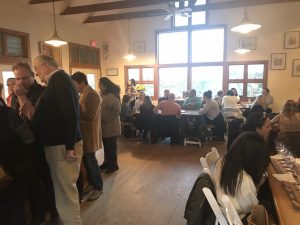
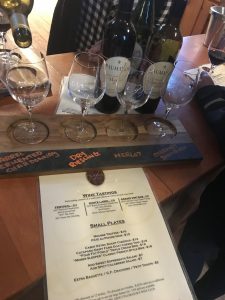
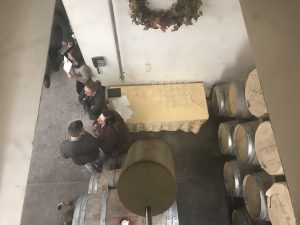
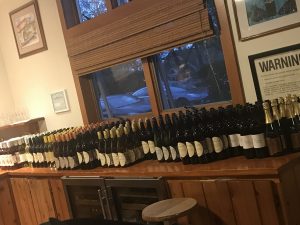
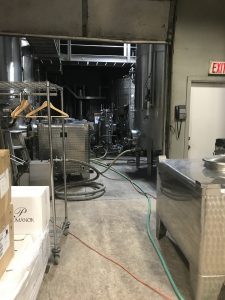
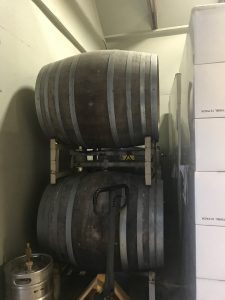
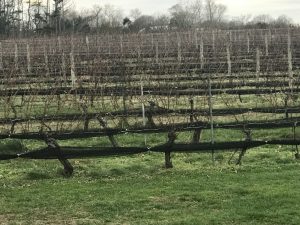
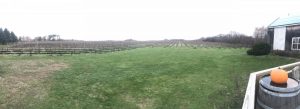
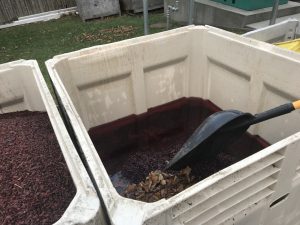
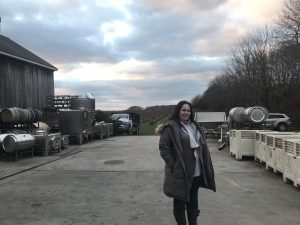



Your photos make a positive contribution to the expression of what was learned, well chosen.